[下册]Unit Eleven研究生英语
英语高考课件unit 11 32
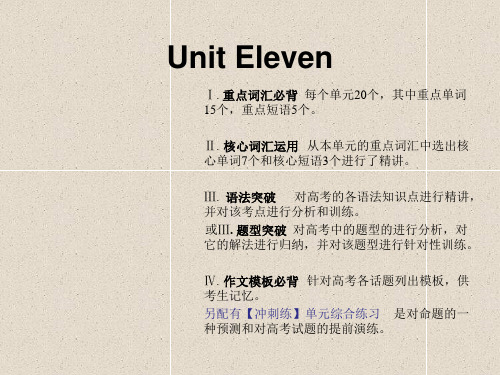
• Keys: (1) culture (2) cultural (3) cultural
2. curious adj. 好奇的;奇妙的; 不寻常的
• 构词 curiosity n. 好奇心;好奇;稀奇的人或物
• 用法 be curious about 对……感到好奇的
• 例句 The boy was curious about everything he saw.
Unit Eleven
Ⅰ. 重点词汇必背 每个单元20个,其中重点单词 15个,重点短语5个。
Ⅱ. 核心词汇运用 从本单元的重点词汇中选出核 心单词7个和核心短语3个进行了精讲。
Ⅲ. 语法突破 对高考的各语法知识点进行精讲, 并对该考点进行分析和训练。 或Ⅲ. 题型突破 对高考中的题型的进行分析,对 它的解法进行归纳,并对该题型进行针对性训练。
• The seedling was frozen _________.
6. declare [di'klεə] v. 宣言;宣布; 声明;申报
• 构词 declaration n. 宣言;宣布;申报
• 用法 declare war on a country 向某国宣战
•
declare against 宣称或声明反对
• 操练 填入适当的词组使句子完整。
• (1) 明天我将要去拜访他。
• Tomorrow I’ll __________ him.
• (2) 我们的新朋友上周曾来我们家拜访。
• Our new friends __________ our house last week.
• Keys: (1) call on (2) called at
• 用法 social custom 社会风俗
辽宁师范版小学英语六年级下册Unit11_第2课时知识点总结教案
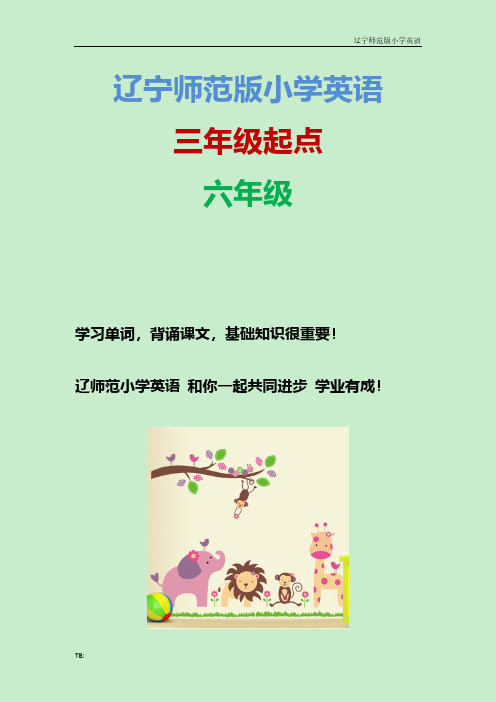
( )(2) Did you go to see a film yesterday?
( )(3) Who grew bigger last year, you or your father?
( )(4) Were you eleven last year?
A. No, I wasn’t.
B. Yes, I did.
辽宁师范版小学英语
辽宁师范版小学英语 三年级起点 六年级
学习单词,背诵课文,基础知识很重要! 辽师范小学英语 和你一起共同进步 学业有成!
TB:
辽宁师范版小学英语
Unit11 第 2 课时教学设计
【内容来源】辽宁师范大学出版社(三起点)六年级下册 Unit11
【主 题】The class play
三、课前准备(Teaching preparation)
课文图片、教学音频等。
四、教学建议 (Teaching suggestions)
Step 1: Warm-up
1. 问答练习。教师请学生用“What did you do...? I...”进行问答,复习一般
过去时。
2. 教师说动词原形,学生说出相应的过去式。可以配合不同速度和节奏以
Unit 11
【教学反思】
TB:
辽宁师范版小学英语
相信自己,就能走向成功的第一步 教师不光要传授知识,还要告诉学生学会生活。数学思维
可以让他们更理性地看待人生
TB:
6. 教师引导学生自读 A joke 中的内容并画出生词,并利用图片及上下文猜 测词义。然后小组合作画出动词过去式,写出其动词原形,自学单词和短语。 如果还有不懂的地方,可以请老师讲解。
7. 学生打开书,跟录音齐读 A joke 中的短文。然后教师检查学生们的朗读 情况,可以抽查个别学生或每个学生读一句,也可以请两位同学,一人读英 文,一人翻译成汉语,帮助全班学生更好地理解全文。 Step 3: Practice
新目标英语七年级(下)Unit_11知识要点归纳
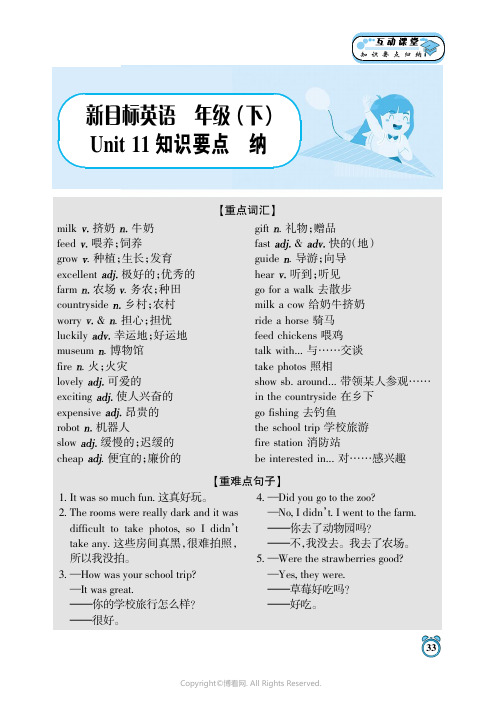
栏纳milk 挤奶牛奶feed 喂养;饲养grow .种植;生长;发育excellent 极好的;优秀的farm 农场.务农;种田countryside 乡村;农村worry &.担心;担忧luckily 幸运地;好运地museum .博物馆fire .火;火灾lovely 可爱的exciting 使人兴奋的expensive 昂贵的robot 机器人slow 缓慢的;迟缓的cheap .便宜的;廉价的gift .礼物;赠品fast &快的(地)guide .导游;向导hear 听到;听见go for a walk 去散步milk a cow 给奶牛挤奶ride a horse 骑马feed chickens 喂鸡talk with...与……交谈take photos 照相show sb.around...带领某人参观……in the countryside 在乡下go fishing 去钓鱼the school trip 学校旅游fire station 消防站be interested in...对……感兴趣1.It was so much fun.这真好玩。
2.The rooms were really dark and it was difficult to take photos,so I didn ’t take any.这些房间真黑,很难拍照,所以我没拍。
3.—How was your school trip?—It was great.———你的学校旅行怎么样?———很好。
4.—Did you go to the zoo?—No,I didn ’t.I went to the farm.———你去了动物园吗?———不,我没去。
我去了农场。
5.—Were the strawberries good?—Yes,they were.———草莓好吃吗?———好吃。
【重点词汇】【重难点句子】33Copyright ©博看网. All Rights Reserved.。
2019-2020年人教版英语七年级下册Unit 11 How was your school tr
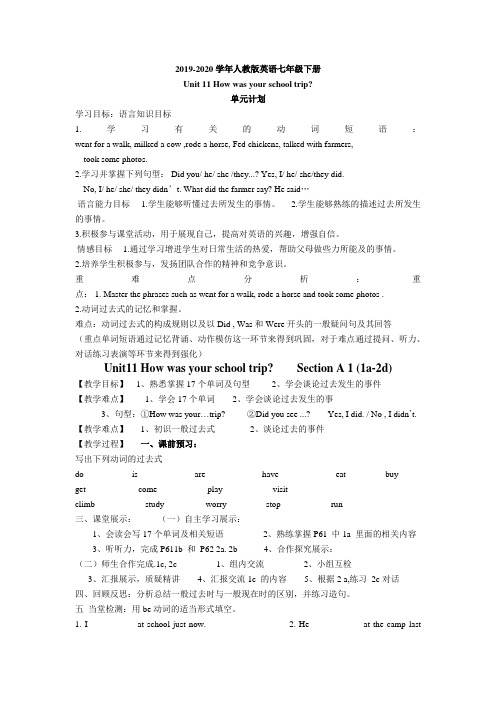
2019-2020学年人教版英语七年级下册Unit 11 How was your school trip?单元计划学习目标:语言知识目标1.学习有关的动词短语:went for a walk, milked a cow ,rode a horse, Fed chickens, talked with farmers,took some photos.2.学习并掌握下列句型: Did you/ he/ she /they...? Yes, I/ he/ she/they did.No, I/ he/ she/ they didn’t. What did the farmer say? He said…语言能力目标 1.学生能够听懂过去所发生的事情。
2.学生能够熟练的描述过去所发生的事情。
3.积极参与课堂活动,用于展现自己,提高对英语的兴趣,增强自信。
情感目标 1.通过学习增进学生对日常生活的热爱,帮助父母做些力所能及的事情。
2.培养学生积极参与,发扬团队合作的精神和竞争意识。
重难点分析:重点: 1. Master the phrases such as went for a walk, rode a horse and took some photos .2.动词过去式的记忆和掌握。
难点:动词过去式的构成规则以及以Did , Was 和 Were 开头的一般疑问句及其回答(重点单词短语通过记忆背诵、动作模仿这一环节来得到巩固,对于难点通过提问、听力、对话练习表演等环节来得到强化)Unit11 How was your school trip? Section A 1 (1a-2d)【教学目标】1、熟悉掌握17个单词及句型2、学会谈论过去发生的事件【教学难点】1、学会17个单词2、学会谈论过去发生的事3、句型:①How was your…trip? ②Did you see ...? Yes, I did. / No , I didn’t. 【教学难点】1、初识一般过去式2、谈论过去的事件【教学过程】一、课前预习:写出下列动词的过去式do______ is_______ are_______ have_______ eat____ buy_____ get______ come ______ play _____ visit______climb ______ study _____ worry_____ stop _____ run_____三、课堂展示:(一)自主学习展示:1、会读会写17个单词及相关短语2、熟练掌握P61 中1a 里面的相关内容3、听听力,完成P611b 和P62 2a. 2b4、合作探究展示:(二)师生合作完成.1c, 2c 1、组内交流2、小组互检3、汇报展示,质疑精讲4、汇报交流1c 的内容5、根据2 a,练习2c对话四、回顾反思:分析总结一般过去时与一般现在时的区别,并练习造句。
【初中英语】人教版七年级下册Unit 11 第4课时分层训练(Section B2 2a—2练习题

人教版七年级下册Unit 11 第4课时分层训练(Section B2 2a—2c)(1025)1.D e a r M ich a e l,I h a d a go o d d a y to d a y.It wa s ra in y in the mo r n ing,s o I s ta ye d a t ho me a nd r e ad a h is to ry b o ok.It wa s ve r y in te r e s tin g.In th e a f te rno o n,th e s un c a me o ut.I we n t to the pa r k with my two f r ie n d s by b ik e.T h e a ir wa s n ic e an d c le an a f te r the r a in.T h e re we r e lo ts o f pe op le in the p a rk.T h e y we r e wa tc h in g f lo we r s.T he r e we r e ma n y k in d s o f f lo we r s in th e p a r k.T he y we r e so be au tif u l.We to ok ma n y p h o to s o f t h em.We s ta ye d in the p a rk f o r two h o u rs.A f te r th a t we we n t to a r e s tau r a n t to ha ve d in n e r.T h e r e s ta u r an t wa s jus t a c r o s s f r o m th e p a rk.Th e b e e f d u mp lin gs th e r e we r e ve r y d e li c io u s.We ha d ma n y d u mp lin g s.I s till f e el f u ll n o w.H o w wa s yo u r d a y?You r s,N ick(1)W ha t d id N ic k do th is mo r n in g()A.He d id h is h o me wo rk.B.H e r e ad a h is to r y b o o k.C.H e we n t to the pa r k.D.He c lea n ed h is r oom.(2)Ho w was th e we a the r in the a f te r n oo n?()A.R a in y.B.C lou d y.C.S u nn y.D.Win d y.(3)Ho w d id the y g o to th e p a r k?()A.B y b ik e.B.B y b u s.C.B y c a r.D.On f oo t.(4)Th e u n de r lin ed wo rd“the m”r e f e r s to(指的是)“”.()A.th e p e op leB.the ph o tosC.N ick's f r ie n d sD.th e f lo we r s(5)N ic k a n d h is f r ie n ds h ad fo r d in n er.()A.n o od le sB.r iceC.du mp lin g sD.h a mb u rg e r s2.La s t S a tu r d a y o u r c la ss h a d a tr ip.We wan te d to do s o me th ing ex citin g.So we d e c ide d1.to the mo u n ta in n e a r o u r c ity.T h a t d a y,the we a th e r wa s g r e a t,s un n y2.no t h o t.We s ta r te d a t e igh t.3.th e wa y we ta lke d an d s a n g.S oo n we a r r ived th e r e.It wa s re a lly a wo n de r f u l mo u n ta in.I c ou ld n't wa it4.to the to p.I5.tok n o w wh a t th e top was lik e.Ab ou t a n ho ur la te r,I s to pp e d 6.a re s t.I lo ok e d b a c k.O h,my f r ie n d A lic e wa s a b ou t 100me te r s b eh ind me.Sh e7.to b e ve r y tir e d.I a s k ed h e r to f o llo w me s o th a t I 8.he lp he r.A t ab ou t e le ve n,we go t to th e top.T h e re I b ou g h t a g if t fo r 9.s is te r b u t n oth in g fo r mys e lf in th e g if t sh o p.A t n ig h tI wr o te a10.ab out th e tr ip.(1)(2)(3)(4)(5)(6)(7)(8)(9)(10)3.他一点也不喜欢骑马。
2020-2021学年七年级下册英语人教习题课件 Unit 11

三、从下面方框中选择合适的选项补全对话。其中有两项为多余项。 A:Good morning,Gina. B:Good t to Tom's party. B:13.____A A:It was terrible.There were too many people and there was just a little food when I got there.So I just drank some juice.
B:14.____D A:No,I didn't.I just talked with some friends and then I left at ten. B:15.____C A:I got home at eleven.16.____F B:Yes,I went boating with my family and all of us had a good time.
英语
七年级下册 人教版
第二课时 Section A (2a2d)
一、根据句意,选择方框中的单词并用其适当形式填空。
grow,pick,anything,farm,excellent
1.Wang Lin didn't see __a_n_y_t_h_iinngthe house. 2.We are feeding chickens and they are ___p_i_c_k_in_gapples. 3.Mrs. Yang is a(n) ____e_x_ce_l_le_ntetacher.We all like her. 4.They ___g_r_e_w_flowers in the park last year. 5.Look!Some ___f_a_rm__e_r_sare milking cows on the ___fa_r_m.
人教版英语七年级下册单元Unit 11 知识点+测试卷+思维导图
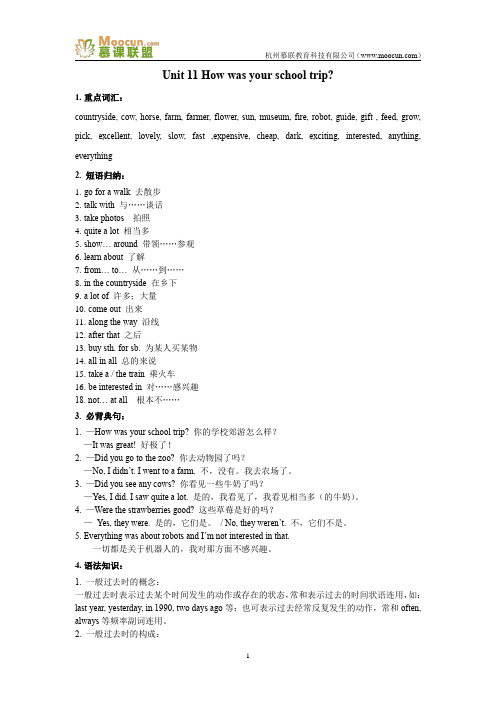
Unit 11 How was your school trip?1.重点词汇:countryside, cow, horse, farm, farmer, flower, sun, museum, fire, robot, guide, gift , feed, grow, pick, excellent, lovely, slow, fast ,expensive, cheap, dark, exciting, interested, anything, everything2. 短语归纳:1.go for a walk 去散步2.talk with 与……谈话3.take photos 拍照4.quite a lot 相当多5.show… around 带领……参观6.learn about 了解7.from… to… 从……到……8.in the countryside 在乡下9.a lot of 许多;大量e out 出来11.along the way 沿线12.after that 之后13.buy sth. for sb. 为某人买某物14.all in all 总的来说15.take a / the train 乘火车16.be interested in 对……感兴趣18. not… at all 根本不……3. 必背典句:1. —How was your school trip? 你的学校郊游怎么样?—It was great! 好极了!2. —Did you go to the zoo? 你去动物园了吗?—No, I didn’t. I went to a farm. 不,没有。
我去农场了。
3. —Did you see any cows? 你看见一些牛奶了吗?—Yes, I did. I saw quite a lot. 是的,我看见了,我看见相当多(的牛奶)。
4. —Were the strawberries good? 这些草莓是好的吗?—Yes, they were. 是的,它们是。
人教版七年级英语下册《Unit11》单元测试01
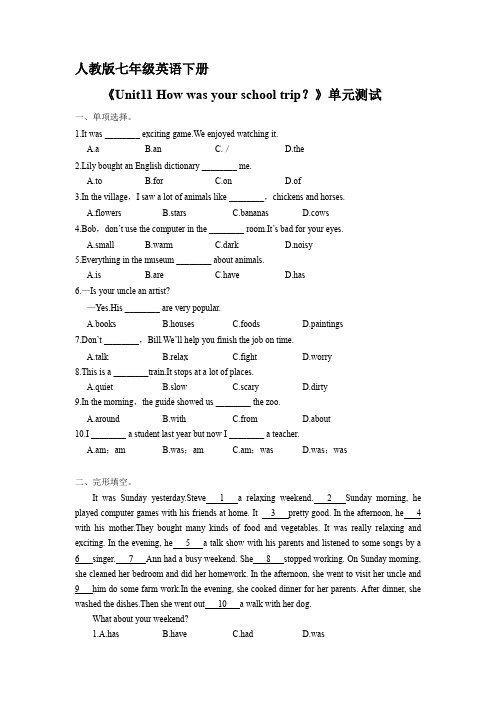
人教版七年级英语下册《Unit11 How was your school trip?》单元测试一、单项选择。
1.It was ________ exciting game.We enjoyed watching it.A.aB.anC./D.the2.Lily bought an English dictionary ________ me.A.toB.forC.onD.of3.In the village,I saw a lot of animals like ________,chickens and horses.A.flowersB.starsC.bananasD.cows4.Bob,don’t use the computer in the ________ room.It’s bad for your eyes.A.smallB.warmC.darkD.noisy5.Everything in the museum ________ about animals.A.isB.areC.haveD.has6.—Is your uncle an artist?—Yes.His ________ are very popular.A.booksB.housesC.foodsD.paintings7.Don’t ________,Bill.We’ll help you finish the job on time.A.talkB.relaxC.fightD.worry8.This is a ________train.It stops at a lot of places.A.quietB.slowC.scaryD.dirty9.In the morning,the guide showed us ________ the zoo.A.aroundB.withC.fromD.about10.I ________ a student last year but now I ________ a teacher.A.am;amB.was;amC.am;wasD.was;was二、完形填空。
人教版新目标七年级英语下册Unit11单元检测卷(含答案详解)
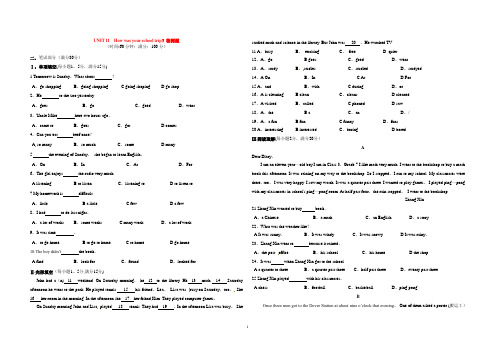
UNIT 11 How was your school trip?检测题(时间:60分钟;满分:100分)二、笔试部分(满分80分)Ⅰ。
单项填空(每小题1。
5分,满分15分)1.Tomorrow is Sunday。
What about ?A。
go shopping B。
going shopping C.going shoping D.go shop2。
He to the zoo yesterday.A。
goes B。
go C。
goed D。
went3。
Uncle Mike here two hours ago。
A。
came to B。
goes C。
got es4。
Can you eat beef once?A.so many B。
so much C。
some D.many5. the evening of Sunday,she began to learn English。
A。
On B。
In C。
At D。
For6。
The girl enjoys the radio very much.A.listeningB.to listen C。
listening to D.to listen to7.My homework is difficult.A。
little B.a little C.few D.a few8。
I had to do last night。
A。
a lot of works B。
some works C.many work D。
a lot of work9。
It was time 。
A。
to go home B.to go to home C.to home D.go home10.The boy didn’t the book。
A.find B。
look for C。
found D。
looked forⅡ.完形填空(每小题1。
5分,满分15分)John had a(n) 11 weekend. On Saturday morning,he 12 to the library. He 13 math. 14 Saturday afternoon he went to the park. He played tennis 15 his friend,Lea。
人教PEP版英语七年级下册--Unit-11-Part-B 优质教学课件

John went to _m__u_s_e_u_m__. The trip is _b_o_r_i_n_g__.
John
Alice went to _t_h_e_f_a_r_m__. She saw many _a_n_i_m__a_ls_. The trip is _g_r_e_a_t .
Alice
go on a trip 去旅行
June 15th
Language points
1. visit a fire station 参观消防站 fire 作不可数名词时,意为“火”;作可数名词 时,意为“火灾;炉火;灶火”。
常见短语:be on fire着火 put out a fire灭火 fire station消防站 make a fire生火
快地(的) adv. & adj. 机器人 n. 导游;向导 n. 礼物;赠品 n. 总的说来 所有事物;一切 pron.
fast robot guide gift all in all everything
感兴趣的 adj. 对……感兴趣 黑暗的;昏暗的 adj. 听到;听见 v.
interested be interested in dark hear (heard)
2a
Do the following words describe good things or bad things? Put a√ for good and an×for
bad. Leave a blank if they can mean both.
_√__ interesting _×__ difficult _√__ lovely _×__ slow
I went to ...
Unit Eleven《饭店实用英语》

Unit Eleven
Words & Phrases
• boost v. 兴盛,推进 • incorporate v. 合并 • fitness n. 健康 • snorkeling n. 带呼吸管潜水 • health conscious adj. 关心健康的 • ailment n. 疾病,不适 • substance n. 物质 • enticing adj. 诱人的 • exotic adj. 外来的,外国的 • holistic adj. 整体的,全面的 • practitioner n. 开业医生 • wellness n. 健康
Notes
• 4.mini style:迷你式。 noble style:高贵式。 horse tail style:马尾式。 hair swept back:后掠式。 chaplet hair style:盘花式。 shoulder length hair style:齐肩式。
• 5.yoga:a system of exercises practised to promote the control of the body and mind.
Notes
• 1.water ski:to plane or glide over the water's surface on water skis while being towed by a motorboat.
• 2.scuba diving:the activity of diving with scuba equipment as distinguished from skin diving or free diving without an air supply.
初一年级下册英语十一单元作文

初一年级下册英语十一单元作文In Unit Eleven of the first grade English textbook, we have learned about different animals and their habitats. Oneof the animals we studied is the panda. Pandas are black and white bears that live in the bamboo forests of China. Theyare known for their cute appearance and love of bamboo.Another animal we learned about is the kangaroo. Kangaroos are marsupials that live in Australia. They have a large pouch on their stomach where they carry their young. Kangaroos are known for their ability to hop long distances and their powerful hind legs.We also studied the polar bear, which lives in the Arctic regions. Polar bears are well-adapted to the cold environment, with thick fur and a layer of fat to keep them warm. They are excellent swimmers and hunters, able to catch seals in theicy waters.Overall, learning about different animals and their habitats has been fascinating. It is important to understand and appreciate the diversity of life on Earth. I look forward to studying more about animals in the future.。
Unit 11 单元检测-2022-2023学年七年级英语人教版下册
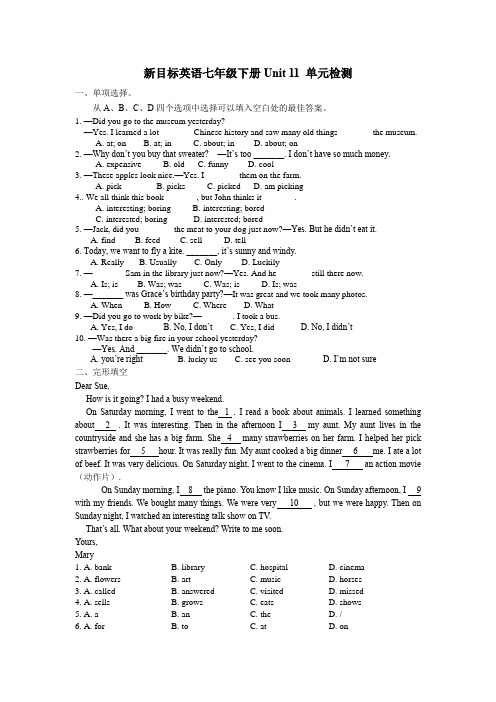
新目标英语七年级下册Unit 11 单元检测一、单项选择。
从A、B、C、D四个选项中选择可以填入空白处的最佳答案。
1. —Did you go to the museum yesterday?—Yes. I learned a lot _______ Chinese history and saw many old things _______ the museum.A. at; onB. at; inC. about; inD. about; on2. —Why don’t you buy that sweater?—It’s too _______. I don’t have so much money.A. expensiveB. oldC. funnyD. cool3. —These apples look nice.—Yes. I _______ them on the farm.A. pickB. picksC. pickedD. am picking4.. We all think this book _______, but John thinks it _______.A. interesting; boringB. interesting; boredC. interested; boringD. interested; bored5. —Jack, did you _______ the meat to your dog just now?—Yes. But he didn’t eat it.A. findB. feedC. sellD. tell6. Today, we want to fly a kite. _______, it’s sunny and windy.A. ReallyB. UsuallyC. OnlyD. Luckily7. —_______ Sam in the library just now?—Yes. And he _______ still there now.A. Is; isB. Was; wasC. Was; isD. Is; was8. —_______ was Grace’s birthday party?—It was great and we took many photos.A. WhenB. HowC. WhereD. What9. —Did you go to work by bike?—_______. I took a bus.A. Yes, I doB. No, I don’tC. Yes, I didD. No, I didn’t10. —Was there a big fire in your school yesterday?—Yes. And _______. We didn’t go to school.A. you’re rightB. lucky usC. see you soonD. I’m not sure二、完形填空Dear Sue,How is it going? I had a busy weekend.On Saturday morning, I went to the 1. I read a book about animals. I learned something about 2 . It was interesting. Then in the afternoon I 3 my aunt. My aunt lives in the countryside and she has a big farm. She 4 many strawberries on her farm. I helped her pick strawberries for 5 hour. It was really fun. My aunt cooked a big dinner 6me. I ate a lot of beef. It was very delicious. On Saturday night, I went to the cinema. I 7 an action movie (动作片).On Sunday morning, I 8 the piano. You know I like music. On Sunday afternoon, I9 with my friends. We bought many things. We were very 10 , but we were happy. Then on Sunday night, I watched an interesting talk show on TV.That’s all. What about your weekend? Write to me soon.Yours,Mary1. A. bank B. library C. hospital D. cinema2. A. flowers B. art C. music D. horses3. A. called B. answered C. visited D. missed4. A. sells B. grows C. eats D. shows5. A. a B. an C. the D. /6. A. for B. to C. at D. on7. A. liked B. saw C. made D. heard8. A. picked B. moved C. practiced D. bought9. A. went shopping B. went swimming C. went skating D. went camping10 A. sad B. excited C. tired D. lucky三阅读理解A篇On May 6, the weather was sunny. My mother took my sister Helen and me to visit Hong Kong Museum of History. The museum is in Kowloon Park (九龙公园). First we went to the swimming pool in the park. Helen and I swam for two hours in the pool.We went to the museum at eleven o'clock. We saw an old store, a village house, an old boat and many other old things. We learned about what Hong Kong was like 100 years ago. In the past, Hong Kong was a small fishing village. Most people were fishermen (渔民).Helen and I took some notes (笔记) about the history of Hong Kong. We also took some photos of the old things. We left the museum at two o'clock in the afternoon.1.The swimming pool is in ________.A. the museumB. the parkC. a villageD. the street2.The writer and Helen didn't ________ in the museum.A. SwimB. take noteC. take photosD. see an old store3.They were in Hong Kong Museum of History for ________ hours.A. twoB. threeC. fourD. five4.From this passage (文章) we know Hong Kong was ________ in the past.A. a village houseB. a fishing companyC. a fishing parkD. a fishing village5.Which of the following is TRUE?A. The writer took a computer to the museum.B. There were lots of fishermen in the park.C. Helen saw an old boat in the museum.D. There was a radio in the museum.B篇Carol teaches history at a middle school. Last week she took Class 1, Grade 7 to Dinosaur Isle. It is a museum. They went there by school bus. The ride took them one and a half hours. The children had a great time and enjoyed the school trip a lot. Carol thought it was great, too. When they were in the museum, Martin showed them around.Here is a letter from Carol to Martin.Dear Martin,I am writing to thank you for a great day on Monday. The children had a wonderful time in the museum. All the 52 children and I thought the school trip was really interesting and educational (有教育意义的). The children were very interested in what you told them. They learned a lot. Thank you very much.Best wishes.Carol1.. What does Carol do?A. She is a doctor.B. She is a teacher.C. She is an artist.D. She is a musician.2. How did the children go to Dinosaur Isle?A. By train.B. By bike.C. By car.D. By bus.3. What did Martin do during the school trip?A. He played soccer with the children.B. He drove the children to the museum.C. He sang some nice songs for the children.D. He showed the children around the museum.4. When did the children visit the museum?A. On Monday.B. On Tuesday.C. On Friday.D. On Sunday.5. Which of the following is TRUE?A. Martin wrote a thank⁃you letter to Carol.B. Fifty⁃two children went to visit the museum.C. Carol thought the school trip was never educational.D. It took the children fifty minutes to get to the museum.C篇We had a terrible school trip last week. Some students were late. Then we waited half an hour for the school bus, but it didnˈt arrive. Finally, our teacher took us to take the subway. It took over an hour. When we arrived at the zoo, we were all tired and hungry. We wanted to see dolphins, but there werenˈt any. There were some really smart seals (海豹), but we didnˈt see the show because we arrived too late. We forgot to take our cameras, s o we didnˈt take any photos. Then it started to rain, and no one had an umbrella. We couldnˈt see many animals because of the rain. So we went for lunch. We ate hamburgers. My friends also had some ice-cream. But I didnˈt have any, because I donˈt like it.I wanted French fries, but they werenˈt any in the shop. They were sold out. Finally we went back to school. We were wet and tired. I didnˈt enjoy my school trip at all.1.Why did the teacher take the students to take the subway?A. Because the students didn’t want to have the trip.B. Because the school bus didn’t arrive.C. Because the students didn’t like taking the school bus.D. Because the students didn’t take cameras.2.The students were ________ when they arrived at the zoo.A. excitedB. happyC. tiredD. worried3.What animal show was there at the zoo?A. The dolphin show.B. The seal show.C. The monkey show.D. The panda show.4.How was the weather after they arrived at the zoo?A. Sunny.B. Cloudy.C. Windy.D. Rainy.5.What did the writer think of the school trip?A. Terrible.B. Great.C. Not bad.D. Fun.D篇How was your school trip?★I was unhappy, because I fell off (从……跌落) my bike and hurt (使受伤) my leg on the school trip. I couldn’t play with my classmates. I just watched them play all day. I wanted to have another school trip!—Jill★I had a good school trip. I saw the sea (海). The water was very clean. I walked on the beautiful beach and had some nice food. I played soccer with my classmates. We had a great time.—Mark★I visited a farm on my school trip. The farm is far away from our school and we took a bus there. I rode a horse, my classmate Lisa milked a cow and Jim fed the chickens. We thought it was very interesting to do those things. Before we went back to school, we talked with the farmers. They told us many things about the farm. I like the school trip very much and I want to go to the farm again.—Julia1. Jill was unhappy on the school trip because she _______.A. lost her bikeB. didn’t like to watch others playC. hurt her footD. couldn’t play with her classmates2..画线单词“beach”的中文意思是“_______”。
新目标七年级下册英语Unit11词汇运用和所给词填空练习题及答案

新目标七年级下册英语Unit11词汇运用和所给词填空练习题根据句意及汉语提示填写单词1.My grandparents like living in the ________(乡村).2.Don't ________ (担心).He can come here on time. 3.We mustn't play with ________ (火).4.Did Tony visit the science ________(博物馆) last week? 5.________ (机器人) can do many things for people.6.He went to the movies. What a you?7.Do you often go s in the supermarket on Sundays?8.How did you s your weekend?9.I often see talk s on Sundays.10.She h dinner at the restaurant last night.11. The farmers g quite a lot of orange trees on the farm.12. It is not easy to ride a h.13. It’s bad for your eyes to read in the s.14. Look at the picture, the girls are p apples on the farm.15. The woman is good at milking a c.16. Mrs. Brown has a(可爱的)daughter.17. The(缓慢的)train is cheap.18. What(礼物)did you give your friend?19. I like the school and e here is new.20. He listened carefully, but he h nothing.21.He is a ______(可爱的) boy ,we all like him.22.The book isn’t _______(贵的),I will take it.23.He told me the ________(令人激动的) news.24.I want to be a _______(向导),when I grow up.25.The ______(机器人) can help people do many things.26. Jill likes music and she is also i________ in sports.27. L________, we didn’t miss the train.28. — What’s in the bag? — I can’t see a________ in it.29. — This pencil box is too e________.— Well, that pencil box is not cheap, either.30. It’s d________ outside and I can see nothing.31. How many ________(奶牛) can you see in the picture?32. Yesterday we ________(摘) apples with our parents. 33. Jimmy, do you like these ________(礼物)?34. The little boy loves to watch the _______(星星)at night.35. Hmm, I don’t think these ________(油画) arevery good.36. The pants are really c . They onlycost me twenty yuan.37. My grandpa lived in the c fiveyears ago, but now he lives with us in the city.38. The movie was ________(使人兴奋的) and Isaw it again and again.39. There are many people working on the________(农场).40. I think Sun Li is an ________(优秀的)actressand I like her very much.41.The ______(机器人)can help us clean the room.42.The rain stopped and the _____ (太阳)came out.43.There was a ______(火)in the hotel last night.44.Mr.Smith is a(n) ________ (优秀的)teacher.Weall like him.45.I’m sorry,I didn’t _______(听见)what you said.翻译出下列短语1.去散步_______2.挤牛奶________2.骑马_______4.喂鸡_________5.拍照__________6.带领某人参观_________6.种植草莓_________8.去钓鱼________9摘草莓_________10从12月到六月______11进行一次学校旅行___________12沿路_________13与某人下棋____________14礼品店_________15可爱的礼物_________16总的来说_________17对……感兴趣________18拍照______________19爬山______________20观看油画_______________写出下列动词的过去式do is are haveeat ____ buy _____get______come______play_____visit______climb______study_____worry_____stop_____run_____写出下列动词的过去式。
考研英语阅读理解精读100篇(高分版)UNIT11
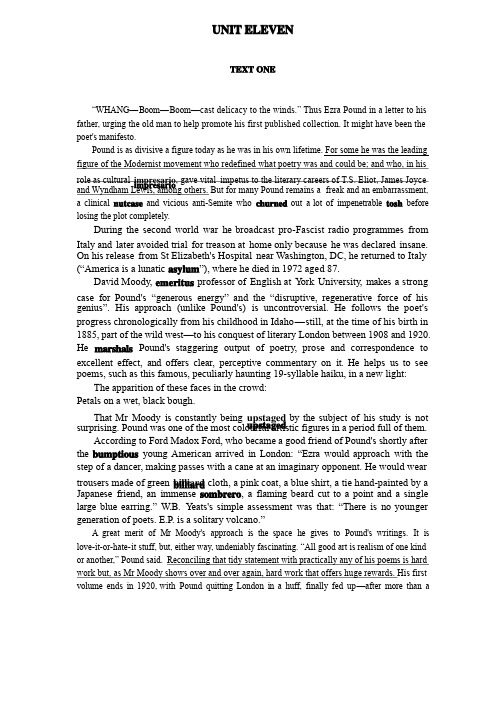
UNIT ELEVENTEXT ONE“WHANG—“WHANG—Boom Boom Boom——Boom Boom—cast delicacy to the winds.” Thus Ezra Pound in a letter to his —cast delicacy to the winds.” Thus Ezra Pound in a letter to his father, urging the old man to help promote his first published collection. It might have been the poet's manifesto.Pound is as divisive a figure today as he was in his own lifetime. For some he was the leading figure of the Modernist movement who redefined what poetry was and could be; and who, in his role as cultural impresario , gave vital impetus to the literary careers of T.S. Eliot, James Joyce and Wyndham Lewis, among others. But for many Pound remains a freak and an embarrassment, a clinical nutcase and vicious anti-Semite who churned out a lot of impenetrable tosh before losing the plot completely.During the second world war he broadcast pro-Fascist radio programmes from Italy and later avoided trial for treason at home only because he was declared insane. On his release from St Elizabeth's Hospital near Washington, DC, he returned to Italy (“America is a lunatic asylum ”), where he died in 1972 age ”), where he died in 1972 aged 87. d 87.David Moody David Moody, , emeritus professor of English at Y ork University University, , makes a strong case for Pound's “generous energy” and the “disruptive, regenerative force of his genius”. His approach (unlike Pound's) is uncontroversial. He follows the poet's progress chronologically from his childhood in Idaho progress chronologically from his childhood in Idaho——still, at the time of his birth in 1885, part of the wild west 1885, part of the wild west——to his conquest of literary London between 1908 and 1920. He marshals Pound's staggering output of poetry poetry, , prose and correspondence to excellent effect, and offers clear, perceptive commentary on it. He helps us to see poems, such as this famous, peculiarly haunting 19-syllable haiku, in a new light:The apparition of these faces in the crowd: Petals on a wet, black bough.That Mr Moody is constantly being upstaged by the subject of his study is not surprising. Pound was one of the most colourful artistic figures in a period full of them.According to Ford Madox Ford, who became a good friend of Pound's shortly after the bumptious young American arriv arrived ed in London: “Ezra would approach with the step of a dancer, making passes with a cane at an imaginary opponent. He would wear trousers made of green billiard cloth, a pink coat, a blue shirt, a tie hand-painted by a Japanese friend, an immense sombrero , a flaming beard cut to a point and a single large blue earring.” W.B. Y eats's simple assessment was that: “There is no younger generation of poets. E.P. is a solitary volcano.”A great merit of Mr Moody's approach is the space he gives to Pound's writings. It is love-it-or-hate-love-it-or-hate-it stuff, but, either way, undeniably fascinating. “All good art is realism of one kind it stuff, but, either way, undeniably fascinating. “All good art is realism of one kind or another,” Pound said. Reconciling that tidy statement with practically any of his poems is hard work but, as Mr Moody shows over and over again, hard work that offers huge rewards. His first volume ends in 1920, with Pound quitting London in a huff, finally fed up up——after more than adecade of doing everything in his power to rattle the intellectual establishment establishment—with —with “British insensitivity to, an insensitivity to, and irritation with, mental agility d irritation with, mental agility in any and every form”. His disgraceful radio programmes and the full blooming of his loopiness lie ahead. So, too, do most of his exquisite Cantos.1. Pound was a divisive figurebecause_____[A] he brought both positive andnegative effect to the development of the Modernist movement. [B] he was both a poet and a person withmental problem. [C] he was politically a racist while hewas also pro-Fascist. [D] he was a man of complex andunintelligible personality. 2. When Pound was released from hospital, he returned to Italy because_____[A] Italy was his hometown. [B] he was persecuted by Americans. [C] he disliked America. [D] he was out of his mind.3. Which one of the following statements is NOT true of David Moody‟s Moody‟s study on study on Pound?[A] His literary approach is unlike that of Pound‟s, being less contradictory . [B] [B] He He focuses on Pound‟s Pound‟s poetry poetry itselfinstead of his personality, attempting to keep objective[C] [C] He traces the poet‟s life in time order He traces the poet‟s life in time order to study Pound‟s ac to study Pound‟s achievement. hievement.[D] His study offers a fresh sight of Pound…s work4.From From Keats‟s simple assessment, it Keats‟s simple assessment, it can be inferred that_____[A] Pound was of exploding power in his literary creation.[B] Pound [B] Pound‟s achievement could hardly ‟s achievement could hardly be reached by later poets. [C] Pou [C] Pound‟s excellence was nd‟s excellence was unsurpassable in his time.[D] It would take a long time forPound‟s generation to fully understand him.5. The word 5. The word ““rattle rattle””(Line 6, Paragraph 7) most probably means _____ [A] set up. [B] destroy [B] destroy. . [C] struggle. [D] disturb.文章剖析:文章剖析:这篇文章主要介绍了Pound 的两个不同侧面。
七年级下册英语第11单元

外研版英语七年级下册Module 11 Body languageUnit 1 They touch noses !课文:Lingling:We’re going to have some Russian teachers at school tomorrow , and I am welcoming the visitors .How do I do that?Betty :Lingling , you know , in Russia , people usually kiss three times , left , right , left .Lingling: What! No, I didn’t know that. We Chinese often shake hands and smile when we meet visitors, and sometimes we nod our heads. But we never kiss. Only parents and children do that.Betty : That’s because people do different things in different countries .Lingling : So what do people in the US usually do when they meet ?Betty : In the US some people shake hands , and some kiss or hug each other . In India, people put their hands together and nod their heads. And do you know what Maori people in New Zealand dowhen they meet?Lingling : No. What do they do?Betty : They touch noses !Unit 2 Here are some ways to welcome themBody language around the worldBy Wang Lingling Our new foreign students are going to arrive very soon, and here are some ways to welcome them.How close do you stand when you talk to a friend? You can sand close to people in the Middle East but don’t stand too close to North Americans! Give them more personal space.How about touching people? Chinese girls often walk arm in arm with their friends. South Americans sometimes hold your arm when they talk to you, so you can’t move away! But in Britain many people don’t like other people to touch them at allDo you look at people when you talk ?In some places, it isn’t polite to look at people when you talk, but in other countries it isn’t polite to look somewhere else. In Britain and the US, people usually look at each other when they talk.And how do you say goodbye ?That’s easy, wave to say goodbye. But be careful! In Greece, it isnot at all polite! In fact, it is very rude!。
新世纪研究生公共英语教材听力下(外教社)答案(unit1,2,3,4,5,6,7,8,9,10,11,12,14)

Unit 1Part A1~5:DCCAB6~10:AACCD11~15:CBCADPart BPassage II1~5:DBBBAII1:there were probably 10 million people.2:it is expected to be 10 billion.3:if the resources could be distributed more equally around the world, there would be enough foreveryone.4:only 10 percent.5:it is how to limit population growth.Passage III1~5:CDCBAII1)1002)55003)40004)more than 28005)Egypt6)4607)less than 260Part D1)award2)glory3)profit4)trust5)dedication6)significance 7)moment8)anguish9)physical10)spirit11)conflict12)alone13)worth14)room15)heart Unit 2Part ADbddccbccbcaPart BPassage IAcdbdCrime analysis officerTop restaurantsAn empty chairTo take itIn pairsSome kind of disturbanceSnatching pursesNever be placedOn the coat hookIn the next stallEnough time to escapePassage IIBcaTTFUnit 3Part ABddcabddbcaccabPart BPassage IAbaddUtilityUtilizeAvailableThe state of art = cutting- edgedDeliver information = pass on informationFacilityFacilitate = help = make sth easierAdapt their methods to incorporate (add) this new media into their teaching Make fundamental impact onCompetive advantagePurchaseJustify its purchase by applying it to routine administrative tasks. Attendance recordsGradingKeep the students interested and productiveEngage sth in distance educationConference–conferencingVia = throughDesktop / laptopPassage IIAdaPopularityTransactionDistribute informationExpediteFunds can be diverted into marketing or advertizing Cyber space knows no national boundaries. NeighborhoodTransmissionEstablish the linkssourcePrivacySecurityDestinationCredit cardTransferredGuaranteeSafer thanPaying forUnit 5Part AAbdccbdabccabSketch outPull everything together ToasterBurn toastSlicesScrape off the burnt part CreditPretty busy = very busyPart BCbcbaSteering wheelTake turns with you at the wheel Patrotic scotsman ExaggeratedReadily agreeWindyhillymountainous“Loch”in the neighborhoodCopious“high tea”take the place of sthBrunch:breakfast and lunchIt consists of one substantial courseLight (heavy) supperContinential breakfast–light meal which consists of bread, juice, mill and jam. Twists and turns (twist and bends)Dips and climbs (ups and downs)HazardActive and impudentA herd of long-haired cattleSavageRun paralell with the seaAlong the coastline fringed withWhich is made ragged with rocky bays and inletsFrom England to ScotlandChanges of sceneryFairly long journeyAt the WheelTravelling withGoing to see the finest sceneryOn arrivingIndeed magnificentUnited kingdom which is abbreviated as UK consists of three parts known as Britian, scotland andWales.Part CCabcaSlopefertileRich pastureMineral rescourcesCoal seamsMing villages grew into towns around iron and steel foundries, chemical work and oil refineries.Seaside resortsEnergeticBe Ideal forChoirEisteddfod = arts festivalNational costumeContribute to the gaiety of the festivalBustle withCelticPart DStateThe will Imagination Freshness Courage over timidity DesertingWrinkle the skin EnthusiasmSoulHeartSpiritWondersWhat’s nextGame of living BeautyInfiniteDownPessimismOptimismyoungUnit 6Part AA aadbdaadabcI had a hard time getting through this novel = find sth difficult Wind up going to the second show = end up doing sth(are you) sorry you decided to take it?Travel agentIt’s all set.Head for a destinationAcademic calendarGrade (grade sth:V)Broad claims that were not supported enoughHas got some sort of conflicts in her scheduleconvincein the minorityhocky finalsshe would be available as backupmake do with what we’ve gotPart BCACDDCriticsCostlyEthnic groupAfrican and HispanicNon-profit institutionanalogy1.in 19262.They can take costly preparation classes3.African-Americans and Hispanics4.About thirty minutes.5.In March, 2005Passage 2BdacbFour years of attendanceLearn science intensivelyPrescribe medicineResidentLength of residency depends onGain entrance to it = enter itWork under guidance of an experience doctor (internship) TreatmentPractice medicine1.In class2.the body3.chemistry and medicines4. How to recognizeReady to useHelping sick peopleUnder the guidanceExamineAdviceEnter a medical traing programUnit 7Part ACabcdccddacadddPart BPassage1DdcadAim at doing sth = aim to do sthDividentRevenueOutput / imputSet the priceImput-mix(optimize/ maximize ) CombinationRaw-materialsObjective = objectAutomatic machinery(assembly line) IngredientWeight-gaingWeight-losingsourcesManagers makeKeep production costsAutomatic machineryThe same taskInstead of buyingIts goods or servicesWithout reducing quality Passage 2DdacbMake sth known–a means of making knownMass - media (medium)Reach certain section of the marketExhibition in trade fairsDirect mail advertisingStriking featureLiquorLarge-scaleShrinkingBe convinced of sthExhibitions, trade fairs, and direct mail advertising, etc.TelevisionThe growth in advertisingThe customers will pay lessWhen the market is growing, advertising helps to increase demand. When the market is shrinking,advertising may prevent a bigger fall in sales than would occur without its support.Part DFrom hereSecretEnoughYour heartHate me Don’t you These things MarryHurtMeansHelp Different “yes”or“no”BelieveHateStarted Gentleman Good enough How dare you? Unit 8Part AA a b a aC d b a aB d b a c LinesBe in the mood forPlay-offsYou can have it for what it cost me. Pore overIndoorsArtificial lightingLose track ofForeshorteningPerspectivePart BPassage 1D a b d bPurchasen.PercentageRevenuesSet its own percentage ConsiderablyFederal governmentNeedyCommunity servicesAlcoholic beverages1.small additional percentage2.buy something3.all the money earned4.owns land or a house5.purchase certain things6.inherits the wealth and property passage 2babcathe first amendment to the Constitution respecting = regarding establishmentprohibit the free exercise thereof protestants outnumberprecludegive no subsidy to any faithPart D1.October2.Candy3.customer4.toy5.superman6.eighty-fourpercent7.disguise8.Ordinarylife9.change10.average11.favorite12.40013.weekends14.popularity15. decorate16. quarter17. eight18. sure thing19. point of view20. growout of itUnit 10Part AD a b c aB d b b aBa b c a3.Ticket counter (box office)Turn in lost and found items8. dig into my savings9. fit it in (it indicates lunch)Stomach is rumbling10. drop out of(he is a college drop-out.)Marching band (in a paradefloat )My grades are really starting to slip. (academic reasons, he has great academic performance. )14. put the finishing touches on sthPart BPassage 1D c c c aDowrydecimumDesertionWithhold consent to all the transactions that her husband madeNone being offered, she succeed inBe obliged to do sthContextPassage 2A b c d bGovernorconstituentstate legislaturesUndertake (fulfill) their traditional responsilities for house making and child rearing.1.120, 7, 92.23, 2 9933.54, 50, 60Unit 11Part ACcaabcabbbaccab2. turn down the jobConvenientMake ends meet4. memorize6. energeticStudy group session7. throw a red T-shirt by accidentRun the clothes through with bleach8. transfer to…Not if I can talk him out of it. (talk sb into sth)Believe me, I am trying.9. enroll in the free seminarSavings accountEligible10. dip11. exhibit is a real bore.12. someone really organizedYou can count me out.15. snap at sbIt’s just end-of-semester pressureHe will be his old self next week.Part BPassage 1B c a d aadministrationdemocraticlowest unemployment in modern times.The lowest inflation in 30 yearsHighest home ownership in the country’s history Dropping crime ratesReduced welfare rollsBalanced budgetAchieve a budget surplusMillenniumCall for a great national initiative to end racial discriminationSought (seek) legislationTo upgrade educationTo protect the jobs of certain parentsTo restrict handgun salesTo strengthen environmental rulesWedExcel as a student and as a saxophone player Professional musicianThis encounter led him to enter a life of public service For personal indiscretionA young White House internImpeachThe House of RepresentativesHe was tried in the Senate (trial)Be found not guilty of the chargesHave unprecedented popular approval ratings1. was born2.19503. Oxford University4. a law degree5. Yale University6.19767.the governorship8. regained office9. the presidential race10. the House of RepresentativesPassage 2C a a b d1. he left schoolhis departure for London2. set foot on the road to fame3. one of the three leading members4. continued writingeleven of his plays5. Shakespeare diedPart D1.very high-priced software2.low cost software3.the Microsoft dream4.The vast majority5.a uniform platform6.grow up8.the PC business9.publishing10.the printing press11.the PC12.new versions of the software13.for software14.digital future15.take a photo16.planning17.the phone and the camera18.go digital19.music20.without digitalUnit 12Part ACdaadcaacbcadaaPart BPassage 1AdcbaTFTTFPassage 2AccbaTFTPart D1.enter politics2.a vision3.attractive4.our sense of shame5.appalled6.violent crime7.reestablish8.a sense of family9.African-American soldier10.Are you afraid?11.with my family12.take care of13.touch me14.as a nation15.as a family16.sharing with each other17.the can-do attitude18.risk failing19.who has received so much20.our American journeyUnit 14Part AAcaacccdcabbccaPart BPassage 1Bddad1.On July 28th, 20022.Thirty3.He was the first American to win the Tour de France and won three races witha Europeanteam.4.He suffered from cancer of the reproductive organs.5.In1999.Passage 2Bcbad1.At Wimbledon, England.2.Twenty.3.In 2000 and 20014.In a poor area of Los Angeles, California.5.In the 1950s.Part D1.in 19642.Canada3.set up4.Two European5.third time6.improve7.the other8.host9.in 192410.sport and culture11.in 200812.a great Games13.prove to be14.proud of15.awarded16.in joy tonight17.in cheers18.dream19.the 29thOlympic Games20.realized。
2011剑桥下册Unit Eleven 基本句型

Unit Eleven 基本句型:Where are you going?(你们准备去哪?)We are going to Shanghai.(我们准备去上海)What about you?(你呢?) How are you going to the farm?(你打算怎样去农场)I’m going there by bike.(我打算骑自行车去那)重点朗读词汇:bus, car, jeep, bike, plane, ship, boat, train重点记忆词汇:bus(公交车)car(小汽车)jeep(吉普车)bike(自行车)plane(飞机)ship(轮船)boat(小船)train(火车)Unit Eleven 基本句型:Where are you going?(你们准备去哪?)We are going to Shanghai.(我们准备去上海)What about you?(你呢?) How are you going to the farm?(你打算怎样去农场)I’m going there by bike.(我打算骑自行车去那)重点朗读词汇:bus, car, jeep, bike, plane, ship, boat, train重点记忆词汇:bus(公交车)car(小汽车)jeep(吉普车)bike(自行车)plane(飞机)ship(轮船)boat(小船)train(火车)Unit Eleven 基本句型:Where are you going?(你们准备去哪?)We are going to Shanghai.(我们准备去上海)What about you?(你呢?) How are you going to the farm?(你打算怎样去农场)I’m going there by bike.(我打算骑自行车去那)重点朗读词汇:bus, car, jeep, bike, plane, ship, boat, train重点记忆词汇:bus(公交车)car(小汽车)jeep(吉普车)bike(自行车)plane(飞机)ship(轮船)boat(小船)train(火车)。
医学院校硕士研究生英语读与写(第二版)UNIT 11

Background information to Text A
2) Related background information The term "drug abuse" does not exclude dependency, but is otherwise used in a similar manner in nonmedical contexts. The terms have a huge range of definitions related to taking a psychoactive drug or performance enhancing drug for a non-therapeutic or non-medical effect. All of these definitions imply a negative judgment of the drug use in question (compare with the term responsible drug use for alternative views).
Outline
Background information to Text A Analysis of the text Global analysis of the text Summary of the text Reference answers to the exercises
医学院校硕士研究生英语 读与写 (第二版)
首都医科大学应用语言学系
English for Master Students in Medical Universities
Department of Applied Linguistics Capital Medical University
新起点五年级下英语第11单元Unit Eleven 保持健康 Keeping Fit
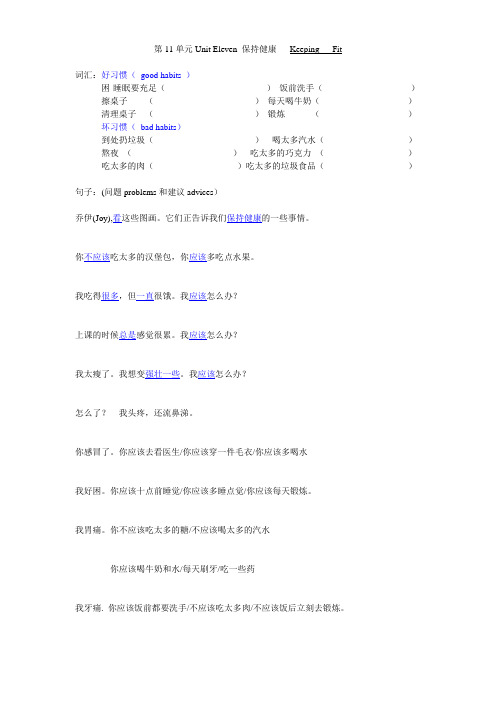
第11单元Unit Eleven 保持健康Keeping Fit词汇:好习惯(good habits )困-睡眠要充足()饭前洗手()擦桌子()每天喝牛奶()清理桌子()锻炼()坏习惯(bad habits)到处扔垃圾()喝太多汽水()熬夜()吃太多的巧克力()吃太多的肉()吃太多的垃圾食品()句子:(问题problems和建议advices)乔伊(Joy),看这些图画。
它们正告诉我们保持健康的一些事情。
____________________________________________________________________________你不应该吃太多的汉堡包,你应该多吃点水果。
____________________________________________________________________________我吃得很多,但一直很饿。
我应该怎么办?____________________________________________________________________________上课的时候总是感觉很累。
我应该怎么办?____________________________________________________________________________我太瘦了。
我想变强壮一些。
我应该怎么办?____________________________________________________________________________怎么了?我头疼,还流鼻涕。
____________________________________________________________________________你感冒了。
你应该去看医生/你应该穿一件毛衣/你应该多喝水____________________________________________________________________________我好困。
- 1、下载文档前请自行甄别文档内容的完整性,平台不提供额外的编辑、内容补充、找答案等附加服务。
- 2、"仅部分预览"的文档,不可在线预览部分如存在完整性等问题,可反馈申请退款(可完整预览的文档不适用该条件!)。
- 3、如文档侵犯您的权益,请联系客服反馈,我们会尽快为您处理(人工客服工作时间:9:00-18:30)。
[4]But will this prodigy*, or any of his rivals, ever unload any appreciable amount of sagacity* on the stump? Will any of them venture to tell the plain truth, the whole truth and nothing but the truth about the situation of the country, foreign or domestic? Will any of them refrain from promises that he knows he can't fulfill - that no human being could fulfill?
查看标*的单词
[ 2 ] Those problems demand for their solution - when they are soluble at all, which is not often - a high degree of technical proficiency, and with it there should go an adamantine* kind of integrity*, for the temptations of a public official are almost as cruel as those of a glamor* girl or a dipsomaniac*.
查看标*的单词
[5]They will all promise every man, woman and child in the country whatever he, she or it wants. They'll all be roving* the land looking for chances to make the rich poor, to remedy the irremediable, to succor* the unsuccorable, to unscramble the unscrambleable, to dephlogisticate* the undephlogisticable.
查看标*的单词
But we train a man for facing them, not by locking him up in a monastery* and stuffing him with wisdom and virtue, but by turning him loose on the stump*. If he is a smart and enterprising* fellow, which he usually is, he quickly discovers there that hooey* pleases the boobs* a great deal more than sense.
After trying a few shots of it on his customers, the larval* statesman concludes sadly that it must hurt them, and after that he taps a more humane* keg*, and in a little while the whole audience is singing "Glory, glory, hallelujah*", and when the returns come in the candidate is on his way to the White House①.
查看标*的单词
Plainly enough, that is too large an order, as anyone must realize who reflects upon the manner in which they reach public office. They seldom if ever get there by merit alone, at least in democratic states. Sometimes, to be sure, it happens, but only by a kind of miracle*. They are chosen normally for quite different reasons, the chief of which is simply their power to impress and enchant* the intellectually underprivileged.
查看标*的单词
The worst of them is a great deal better company than most generals in the army, or writers of murder mysteries, or astrophysicists, and the best is a really superior and wholly delightful man - full of sound knowledge, competent and prudent*, frank and enterprising, and quite as honest as any American can be without being clapped into a madhouse. Don't ask me what his name is, for I am not in politics. I can only tell you that he has been in public life a long while, and has not been caught yet.
I happen to be acquainted to some extent with nearly all the gentlemen, both Democrats and Republicans, who are currently itching for the Presidency, including the present incumbent*, and I testify freely that they are all pleasant fellows, with qualities above rather than below the common.
查看标*的单词
It is a talent like any other, and when it is exercised by a radio crooner*, a movie actor or a bishop*, it even takes on a certain austere* and sorry respectability. But it is obviously not identical with a capacity of the intricate* problems of statecraft*.
查看标*的单词
But not after the issue is fairly joined, and the struggle is on in earnest. From that moment they will all resort to demagogy*, and by the middle of June of election year the only choice among them will be a choice between amateurs of that science and professionals.
查看标*的单词
Far from it. Many of them, in their private characters, are very charming persons, and I have known plenty that I'd trust with my diamonds, my daughter or my liberty, if I had any such things.
《研究生英语精读教程》(第三版下)
中国人民大学出版社
Unit Eleven
The Politician
1. Text 2. Exercise 3. Supplementary Reading
The Politician①
Mencken②
[1]After damning politicians up hill and down dale* for many years, as frauds* and scoundrels*, I sometimes suspect that, like everyone else, I often expect too much of them. Though faith and confidence are surely more or less foreign to my nature, I not infrequently find myself looking to them to be able, diligent*, candid*, and even honest.
查看标*的单词
[3]I hope no one will mistake this brief account of the political process under democracy for exaggeration. It is almost literally true. I do not mean to argue, remember, that all politicians are villains in the sense that a burglar, a childstealer, or a Darwinian① are villains*.
